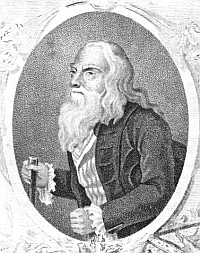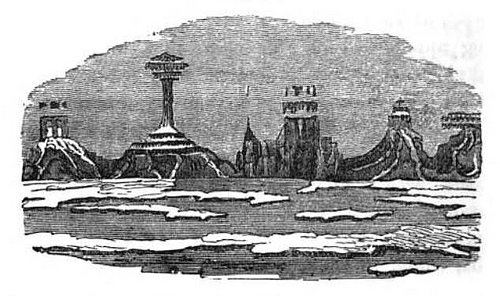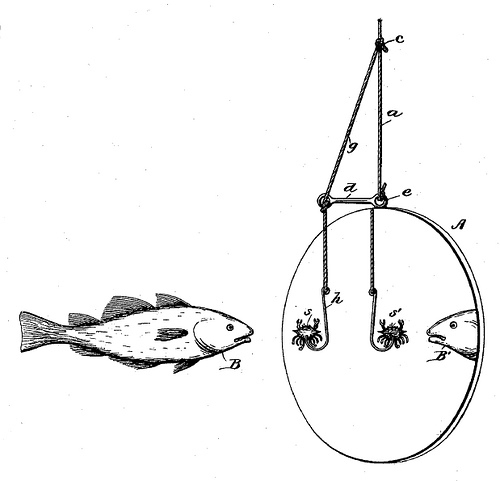The basilisk lizard of Central America can run on water for up to 15 feet, thanks to flaps between its toes.
It’s known as “the Jesus lizard.”
The basilisk lizard of Central America can run on water for up to 15 feet, thanks to flaps between its toes.
It’s known as “the Jesus lizard.”
The body of a child, nine months old, was buried in the ‘Old Burying-Ground,’ Stoddard, N. H., in January, 1818. In 1856, the body was disinterred, with others adjacent to it, for the purpose of removal to another lot. The body of this child alone had petrified. It was nearly as white as marble, and the features were as natural as the day it was buried, though the body soon crumbled on being exposed to the air.
— Miscellaneous Notes and Queries, February 1888

Mark Twain wrote, “Water, taken in moderation, cannot hurt anybody.”
He would have approved of Matthew Robinson, the second Baron Rokeby. Born in 1712, the Scottish nobleman swam in the sea in all weather, sometimes until he fainted, and had drinking fountains installed along his route to the beach.
A visitor noted, “He was accustomed to bestow a few half-crown pieces … on any water drinkers he might happen to find partaking of his favorite beverage, which he never failed to recommend with peculiar force and persuasion.”
Not content with the sea, Robinson eventually even added a glass-enclosed swimming pool to his mansion, where he spent hours.
It doesn’t seem to have hurt him. He shunned physicians, but lived to be 88.
With tragic air the love-lorn heir
Once chased the chaste Louise;
She quickly guessed her guest was there
To please her with his pleas.
Now at her side he kneeling sighed,
His sighs of woeful size;
‘Oh, hear me here, for lo, most low
I rise before your eyes.
This soul is sole thine own, Louise —
‘Twill never wean, I ween,
The love that I for aye shall feel,
Though mean may be its mien!’
‘You know I cannot tell you no,’
The maid made answer true;
I love you aught, as sure I ought —
To you ’tis due I do!’
‘Since you are won, Oh fairest one,
The marriage rite is right —
The chapel aisle I’ll lead you up
This night,’ exclaimed the knight.
— Yonkers Gazette, cited in William T. Dobson, Poetical Ingenuities and Eccentricities, 1882
“At times one remains faithful to a cause only because its opponents do not cease to be insipid.” — Friedrich Nietzsche

Observing the shore of Greenland in July 1820, explorer William Scoresby was surprised to see it change before his eyes:
The general telescopic appearance of the coast was that of an extensive ancient city abounding with the ruins of castles, obelisks, churches and monuments, with other large and conspicuous buildings. Some of the hills seemed to be surmounted by turrets, battlements, spires, and pinnacles; while others, subjected to one or two reflections, exhibited large masses of rock, apparently suspended in the air, at a considerable elevation above the actual termination of the mountains to which they referred.
All of this was continually changing even as he watched, Scoresby writes. But “notwithstanding these repeated changes, the various figures represented in the drawing had all the distinctness of reality; and not only the different strata, but also the veins of the rocks, with the wreaths of snow occupying ravines and fissures, formed sharp and distinct lines, and exhibited every appearance of the most perfect solidity.”
On the 18th of December, 1795, several persons, near the house of Captain Topham, in Yorkshire, heard a loud noise in the air, followed by a hissing sound, and soon after felt a shock, as if a heavy body had fallen to the ground at a little distance from them. In reality, one of them saw a huge stone fall to the earth, at the distance of eight or nine yards from the place where he stood. When he first observed it, it was seven or eight yards above the ground; and in its fall, it threw up the mould on every side, burying itself twenty-one inches in the earth. This stone, on being dug up, was found to weigh 56 lbs.
— Cabinet of Curiosities, Natural, Artificial, and Historical, 1822

William Lamb was pretty cynical about fish. This apparatus, patented in 1894, assumes that a fish that sees itself in a mirror “will be made bolder by the supposed companionship, and more eager to take the bait before his competitor seizes it.”
“He will lose his caution,” Lamb wrote, “and take the bait with a recklessness that greatly increases the chances of his being caught on the hook.”
Who knows? Maybe it even works.
fysigunkus
n. one who lacks curiosity
Mr. Brograve, of Hamel, near Puckridge in Hertfordshire, when he was a young man, riding in a lane in that county, had a blow given him on his cheek: (or head) he looked back and saw that nobody was near behind him; anon he had such another blow, I have forgot if a third. He turned back, and fell to the study of the law; and was afterwards a Judge. This account I had from Sir John Penruddocke of Compton-Chamberlain, (our neighbour) whose Lady was Judge Brograve’s niece.
— John Aubrey, Miscellanies Upon Various Subjects, 1696